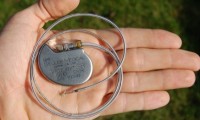-
BD hires new chief medical officer from 3M Health Care
- Source: drugdu
- 96
- November 27, 2023
-
UTS researcher tests new handheld device for rapidly and accurately identifying drug specimens
- Source: drugdu
- 158
- November 18, 2023
-
Major trial finds apixaban reduces stroke risk in patients with device-detected atrial fibrillation
- Source: drugdu
- 109
- November 15, 2023
-
FDA extends pandemic-era policy allowing certain device, production changes without prior approval
- Source: drugdu
- 133
- November 5, 2023
-
CooperCompanies buys reproductive health products from Cook Medical after failed takeover
- Source: drugdu
- 163
- November 4, 2023
-
FDA warning letter accuses Wavi of selling unapproved neurological device
- Source: drugdu
- 220
- November 3, 2023
-
FDA says Philips’ testing of recalled devices is inadequate
- Source: drugdu
- 116
- October 8, 2023
-
FDA expands total product life cycle program to cover neurological devices
- Source: drugdu
- 196
- October 4, 2023
-
CMS leader defends breakthrough device reimbursement proposal at House hearing
- Source: drugdu
- 98
- September 22, 2023
-
FDA finalizes breakthrough device changes to target health inequities
- Source: drugdu
- 211
- September 20, 2023
your submission has already been received.
OK
Subscribe
Please enter a valid Email address!
Submit
The most relevant industry news & insight will be sent to you every two weeks.













